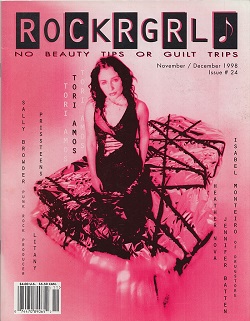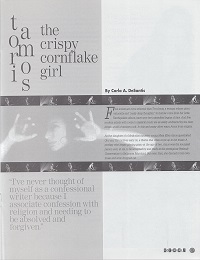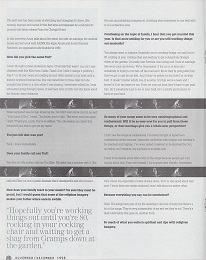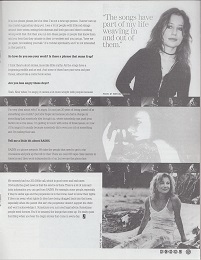|

songs | interviews | photos | tours | boots | press releases | timeline
ROCKRGRL (US)
November/December 1998

tori amos
the crispy cornflake girl
By Carla A. DeSantis
Few artists are more ethereal than Tori Amos, a woman whose piano virtuosity and "really deep thoughts," to borrow a line from her Little Earthquakes album, have won her a steadfast legion of fans. And few modern artists with roots in classical music are as easily embraced by the beat-driven world of modern rock. In this and many other ways, Amos is an enigma.
As the daughter of a Methodist minister, young Myra Ellen Amos questioned God and His motives early on, a theme that often crops up in her music. A prodigy who began playing piano at the age of two, Amos was the youngest person ever, at six, to be accepted by and study at the prestigious Peabody Conservatory in Baltimore, Maryland. But even then, she danced to her own muse and soon dropped out.
The past year has been a year of stretching and changing for Amos. She recently married and toured for the first time accompanied by a full band to promote her latest release, From the Choirgirl Hotel.
In this interview, Amos talks about her name, her take on marriage, her musical muses and her work with RAINN (the Rape, Abuse and Incest National Network), an organization she founded in 1994.
Carla: How did you pick the name Tori?
Tori: I went through a phase as Sammy Jayye. Obviously that wasn't me, but I was obsessed with Sue Ellen from Dallas. Thank God I didn't change it publicly. I was 17 or 18 and I was just noodling around (with names) in my head until a friend's boyfriend rescued me. She only dated him for three days but she brought him down to a club where I was playing. I remember telling her I was exhausted going through names. It had been nine months and she knew about the Sammy Jayye debacle.
What happened was, he just looked at me. He didn't even know me but he said, "Your name is Tori." I went, "You know, you're right." She never saw him again. I said, "Thank you, Linda. You're so selfless. The only reason you dated that beautiful hunk was to get me my name."
Carla: You just felt that it was you?
Tori: Yeah, I knew immediately.
Carla: Does your family call you Tori?
Tori: Yes, they do. My mother calls me Tori Ellen. My sister has a problem with it. She calls me Ellen but not in public because that's disrespectful and she knows it.
Carla: How does your family react to your music? I'm sure they must be proud, but I would guess that some of the religious imagery makes your father wince once in a while.
Tori: He runs my publishing company so, if nothing else, sometimes he can deal with it on a subjective level.
Carla: Continuing on the topic of family, I hear that you got married this year. Is that more settling for you or are you still working things out musically?
Tori: You always want to balance. Hopefully you're working things out until you're 80, rocking in your rocking chair and waiting to get a shag from Gramps down at the garden. I'm really into Formula One racing and I look at marriage like we're race car drivers. We're teammates. If his car is in front and somebody is trying to run him off the road and I know they're going after him, they've got to get by me first. And if they've gotten by me, I'm on their butt. It doesn't matter which one of us wins. It's that we're a team and I know he'd do the same for me. If my car was out front they'd have to get past him. So if somebody's got to be at your back, he's a pretty good person to have at your back.
Carla: So many of your songs seem to be very autobiographical and confessional. Will it be as easy for you now to pull from those things, or does marriage give you a whole new perspective?
Tori: I don't see the songs as confessional. I've never thought of myself as a confessional writer because I associate confession with religion and needing to be absolved and forgiven. I've never asked or wanted to be absolved by God, my father, my President, my nephews or anybody else.
I have to be careful about who's in the songs because people get a bit touchy about that. Even with friends, I try to guard their identity. Sometimes they corner me, especially a bottle of wine down. But I'm very good about that now. I know there are certain subjects I won't talk about no matter what.
Carla: Because everything you say can be scrutinized?
Tori: Yeah. The songs have part of my life weaving in and out of them, but there's a lot in the songs. They're very independent of me and yet they're not. There's a dual relationship that goes on, another force.
Carla: So much of what you write is spiritual and ripe with religious imagery.
Tori: It is, but please, please, let's be clear. I'm not a new age person. I haven't set up my crystal suppository shop yet. I see a lot of people with little red strings around their wrists, seeing their shaman and their guru and there's nothing wrong with that. But then you run into these people or people that know them and you hear that they urinate on their co-workers and you just go, "here we go again, not walking your talk." It's cocktail spirituality and I'm not interested in that part of it.
Carla: So how do you see your work? Is there a phrase that sums it up?
Tori: I think they're short stories, more like little myths. All the songs have a beginning, middle and an end. And some of them have part twos and part threes, almost like a comic book series.
Carla: Are you less angry these days?
Tori: Yeah. Now when I'm angry, it carries a lot more weight with people because I'm very clear about why I'm angry. It's not just 20 years of being pissed off at something you couldn't put your finger on because you had a charge on something that somebody else brought up, where somebody can push your button on a core issue. I'm getting in touch with some of those issues, so now if I'm angry it's usually because somebody did a very poor job at something and now I'm nailing their ass.
Carla: Tell me a little bit about RAINN.
Tori: RAINN is a phone network. We take the people that need to get to the counselors and pick up the bill for that. There are over 600 rape crisis centers in America and they work independently of us, but we are the phone line.
We recently had our 200,000th call, which is good news and bad news. Obviously the good news is that the service is there. There's a lot of nuts and bolts information you can get from RAINN. For example, some people, especially if they're under age and the perpetrator is in the home, need to know their rights. If they run away, what rights do they have being dragged back into the home, especially when the parent that isn't the perpetrator doesn't support the child and won't acknowledge it. Sometimes you just need legal advice. Sometimes people need doctors. You'd be amazed, the things that come up. It's really quite humbling when you hear the tragic stories that come in every day.
original article

 
[scans by Kristal Russell]
t o r i p h o r i a
tori amos digital archive
yessaid.com
|